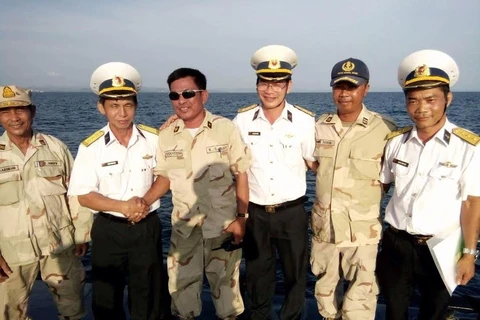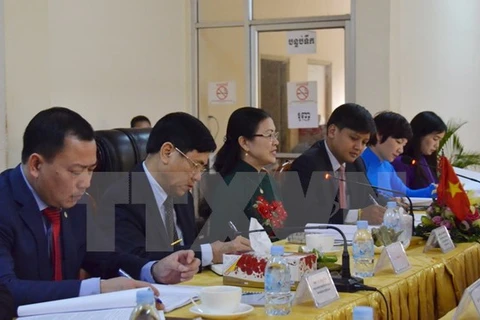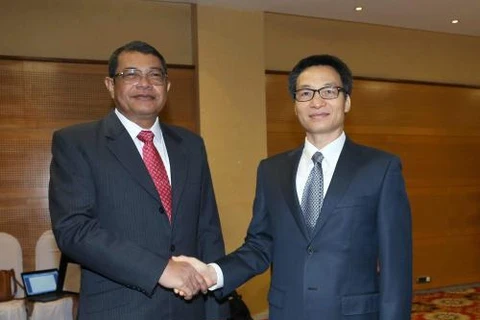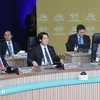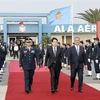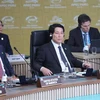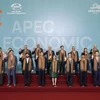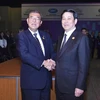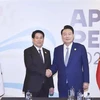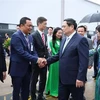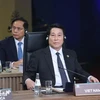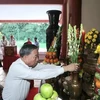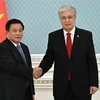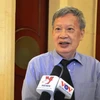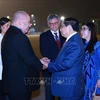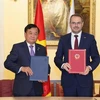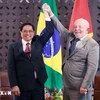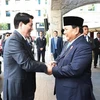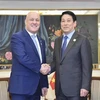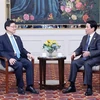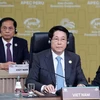Phnom Penh (VNA) – Prime Minister Nguyen Xuan Phuc and his spouse arrived in Pochentong International Airport in Phnom Penh on April 24 afternoon, beginning his two-day official visit to Cambodia at the invitation of his Cambodian counterpart Samdech Techo Hun Sen.
The Prime Minister was scheduled to visit Cambodian King Norodom Sihamoni and meet with Vietnamese expatriates living and studying in Cambodia, and staff in the Vietnamese Embassy on April 24
This is the first official trip of PM Phuc to the neighbouring country in the post of the Government leader of Vietnam.
Vietnam and Cambodia set up diplomatic ties on June 24, 1967. They have maintained delegation exchanges at all levels, thereby consolidating mutual trust between their leaders and people.
Vietnam currently has 190 investment projects with total registered capital of 2.89 billion USD in Cambodia, focusing on agriculture and forestry. Cambodia’s investment in Vietnam has also been on the rise, with 18 projects worth 58.125 million USD at present.
Bilateral trade exceeded 2.9 billion USD in 2016 and is estimated at 936 million USD in the first quarter of 2017, a year-on-year increase of 11.6 percent. The Q1 figure consists of 582 million USD of Vietnamese exports, up 8.9 percent, and 354 million USD worth of Cambodian goods, up 16.2 percent from a year earlier.
About 960,000 Vietnamese people visited Cambodia and 212,000 Cambodians spent holidays in Vietnam last year. That made Vietnam the biggest source of foreign tourists to Cambodia, which in turn ranks 13th in the number of arrivals to Vietnam.
Cooperation between the two sides’ ministries, sectors, localities and organisations have been reinforced through delegation exchanges, mutual support in economic development, collaboration in health care and culture, and people-to-people exchange, thus helping to maintain peace, stability, friendship and cooperation along the shared borderline.-VNA
The Prime Minister was scheduled to visit Cambodian King Norodom Sihamoni and meet with Vietnamese expatriates living and studying in Cambodia, and staff in the Vietnamese Embassy on April 24
This is the first official trip of PM Phuc to the neighbouring country in the post of the Government leader of Vietnam.
Vietnam and Cambodia set up diplomatic ties on June 24, 1967. They have maintained delegation exchanges at all levels, thereby consolidating mutual trust between their leaders and people.
Vietnam currently has 190 investment projects with total registered capital of 2.89 billion USD in Cambodia, focusing on agriculture and forestry. Cambodia’s investment in Vietnam has also been on the rise, with 18 projects worth 58.125 million USD at present.
Bilateral trade exceeded 2.9 billion USD in 2016 and is estimated at 936 million USD in the first quarter of 2017, a year-on-year increase of 11.6 percent. The Q1 figure consists of 582 million USD of Vietnamese exports, up 8.9 percent, and 354 million USD worth of Cambodian goods, up 16.2 percent from a year earlier.
About 960,000 Vietnamese people visited Cambodia and 212,000 Cambodians spent holidays in Vietnam last year. That made Vietnam the biggest source of foreign tourists to Cambodia, which in turn ranks 13th in the number of arrivals to Vietnam.
Cooperation between the two sides’ ministries, sectors, localities and organisations have been reinforced through delegation exchanges, mutual support in economic development, collaboration in health care and culture, and people-to-people exchange, thus helping to maintain peace, stability, friendship and cooperation along the shared borderline.-VNA
VNA

